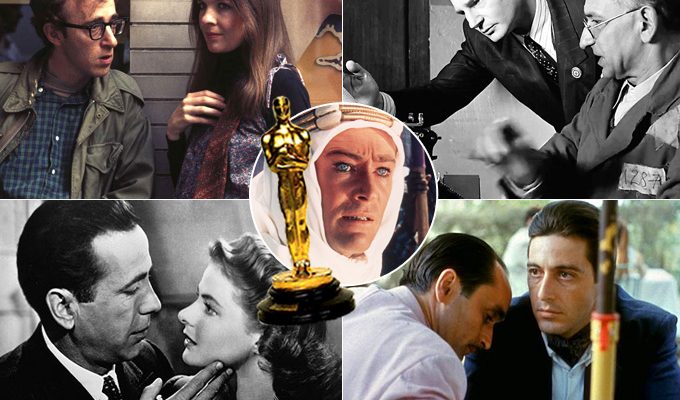60. “All The King’s Men” (1949)
Detailing the rise to prominence and the fall into corruption of a Southern politician, and based on the Pulitzer Prize-winning novel, by a long mile this version is more successful than the turgid Steve Zaillian/Sean Penn one. Broderick Crawford is terrific as the compromised would-be man of the people but the moralism of the slow descent to hell is pretty depressing stuff.
59. “The Best Years Of Our Lives” (1946)
A wildly popular account, at the time, of the difficulties civilian life posed for three servicemen returning from WWII, the William Wyler drama certainly bears nothing but the best intentions. But to a modern eye it’s a bit overlong, and sags in between some of the more affecting scenes, like this one, of Fredric March returning home to Myrna Loy and family.
58. “The King’s Speech” (2010)
Tom Hooper‘s stirring tale of the king with the speech impediment and the therapist who helped him find his voice is pretty much the middle-of-the-road personified, and is hampered a bit by Hooper’s distracting visual style. But it is remarkably satisfying as a crowd-pleaser, and there’s no denying the quality of Colin Firth‘s central turn.
57. “Chariots Of Fire” (1981)
An unlikely underdog that saw its filmmakers pronounce “the British are coming!” when it took the Oscar, “Chariots Of Fire” remains an atypically effective cheer-from-your-seat kind of sports movie. A bit fusty, yes. Formally uninventive, yes. But as the Vangelis score soars, it’s hard not to see why it proved such a surprise crowd-pleaser 30+ years ago.
56. “The Lord Of The Rings: Return Of The King” (2003)
Peter Jackson‘s Tolkien trilogy is a crowing cinematic achievement, but it was the third and least of them that won Best Picture (though it’s still leaps and bounds above ‘The Hobbit‘ films so far). ‘Return Of The King‘ matches the spectacular action and impeccable craft of the first two, but lacks the tight focus of the first or the more emotional qualities of the second. And of course, it goes on foreeeeveeeeeeeer.
 55. “A Man For All Seasons” (1966)
55. “A Man For All Seasons” (1966)
A sincere and prestigious mounting of the Robert Bolt play about the staunchly Catholic Sir Thomas More’s refusal to recognize King Henry VIII’s divorce, it’s every bit as stately as that description sounds, and every bit as dull. Paul Scofield reprises his theatrical role as Moore, and Orson Welles and John Hurt lift things in supporting roles, but Fred Zinnemann’s game direction can’t overcome the verbosity and heaviness of the film’s stage origins.
54. “Million Dollar Baby” (2004)
The Academy’s love for Clint Eastwood knows few limits, as evidenced by the 4-major-Oscar sweep for this extremely familiar-feeling underdog boxing story. That the boxer was a woman (Hilary Swank, getting her second Best Actress Oscar) was really the only unusual element to an admittedly solid, well-made drama, barring the sucker punch ending.
53. “Shakespeare In Love” (1998)
Much-denigrated after the fact when it beat “Saving Private Ryan” to the gold (especially after a bitter and bad-tempered Oscar campaign), “Shakespeare In Love” has aged reasonably well. It’s hardly an all-time classic, but it’s an enjoyable and moving upmarket rom-com, with a cast having a ball, and a sparkling script from Tom Stoppard.
52. “Ben Hur” (1959)
The most epic of all the epics (it’s the longest Best Picture winner ever, beating ‘Return Of The King‘ by ten minutes, and ties that film and “Titanic” for most ever Oscar-wins), “Ben Hur” remains a real wow on the big screen even now. It’s overlong and preachy, and Charlton Heston is a bit ropey as the title character, but remains a staggering achievement, with some of the finest action sequences in the history of the medium.
51. “Mrs. Miniver” (1942)
Overshadowed a bit these days by some of its contemporaries, William Wyler‘s WWII melodrama, about the life of a well-to-do British woman in the early years of the war, is old-fashioned and unabashed in its role as propaganda. But it’s well-executed, stirring, and has a great lead performance from Greer Garson (whose own six-minute acceptance speech remains the longest in Oscar history).

